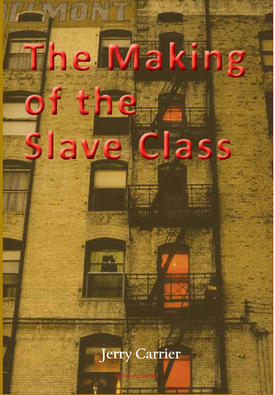
Sound Bite
You can only be a king if you have many peasants. You can only have the super-rich if you have many who are poor. And this is the basis for class.
A nationally recognized instructor in class, race, American culture, economic development and poverty issues, Jerry Carrier offers the personal story of a working class man's early life in poverty combined with a very cogent dissection of the signals and mechanisms that create and maintain the class system in the United States which determines who will prosper and who will fail.
About the Author
Jerry Carrier is a nationally-recognized educator in class, poverty, affordable housing and economic development. He has taught and developed curriculum for universities, state and local governments, schools, and non profits.
Carrier grew up in poverty and as a child lived in a public housing project, an abandoned Navy hospital, ‘en el barrio,’ a rented farmhouse, and a rural wood-heated cabin. In twelve years he attended six elementary schools, a middle school, and two high schools before graduating. He went to work at the age of twelve as a busboy and dishwasher in a railroad depot. He worked various full time jobs through junior high, high school and college supporting his family. He is the first in his family to graduate from high school and college.
Mr. Carrier is a faculty member at the National Graduate School for Community Economic Development at Southern New Hampshire University and for the National Neighborworks Training Institutes. He has worked for over thirty years in community economic development and public administration as an executive director of several nonprofits, a community action agency, a housing authority, and in local governments as an economic development director and planner, and has also been a city manager of several cities. He has also been on the Boards of Director of five nonprofits and a school.
Mr. Carrier’s columns on class, economics, poverty, and politics have been published in over a dozen newspapers and he has been a contributing writer to many nonprofit and government texts on these subjects. He and his family live in Lakeville, Minnesota.
|
|
About the Book
Class is America s forbidden thought. Class and culture rigidly control who we are, who we associate with, and how much money we can earn. American class culture determines who will prosper and who will fail. This culture and the debilitating...
Class is America s forbidden thought. Class and culture rigidly control who we are, who we associate with, and how much money we can earn. American class culture determines who will prosper and who will fail. This culture and the debilitating consequences that make the American slave class are the subject of The Making of the Slave Class.
Written for a general audience, this book is the first historical and cultural analysis of the American class system and the poverty created by it. It could be easily categorized as a work of sociology, history, anthropology or economics. The book analyzes class through all these disciplines.
Not that long ago, the head of the Mormon Church summarized what many Americans believe or at least subconsciously accept when he said, There is a reason why one man is born white rich and with many blessings and another is born black with very few, God has determined each man s proper reward. And while he was widely and deservedly criticized for his remarks, it wasn t because a majority does not believe his views, but rather that they deemed him politically incorrect for bringing race into the question and for saying aloud what many think quietly and keep to themselves.
The American class system is a topic that has not received a great deal of attention from American writers. There are no comprehensive books on the subject that analyze class and poverty from cultural, economic and historic perspectives. This book does the job. Among the few books on the subject are such works as Bobos in Paradise by David Brooks and Class by Paul Fussell, both of which make fun of, belittle and attempt to make literary class war upon the working class in their books. This book fires back.
|
Perhaps you may be offended by the premise of this book: that there is an American slave class, and that it is caused by our culture, particularly by our Christian culture, and by government policies that insure its continued existence. As the author, all I ask is that you read this book before making any judgment.
In addition there are some who...
Perhaps you may be offended by the premise of this book: that there is an American slave class, and that it is caused by our culture, particularly by our Christian culture, and by government policies that insure its continued existence. As the author, all I ask is that you read this book before making any judgment.
In addition there are some who may be outraged by the use of the word slave and the phrase slave class, believing that these somehow belittle the brutality of pre-Civil War slavery. This book makes no such comparison. Slavery has many forms, some more brutal than others. And while some of the most brutal acts of American slavery occurred before the Civil War, these acts do not excuse or lessen the brutality committed on the current slave class, which includes but is not limited to many of the heirs of those pre-Civil War slaves.
|
|
Pages 220
Year: 2010
BISAC: SOC050000
BISAC: SOC031000
Soft Cover
ISBN: 978-0-87586-768-7
Price: USD 23.95
Hard Cover
ISBN: 978-0-87586-769-4
Price: USD 33.95
eBook
ISBN: 978-0-87586-770-0
Price: USD 23.95
Related Books
• Tapestry
— The History and Consequences of America's Complex Culture
|













